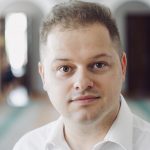A Language of “Sects” in Russian Reflections of Ukrainian Autocephaly

Stanislav Panin holds a PhD in Philosophy from Moscow State University and is a Doctoral Student of the Department of Religion at Rice University
Though I am a scholar of religious studies, I am not an expert in Orthodox Christianity. My specialization is the study of both new religious movements and esoteric communities and their roles in contemporary culture. With such unusual interests, it should come as no surprise that my interests in Russian media coverage of Ukrainian autocephaly were equally unusual. For many years, I have observed that polemical narratives against emerging or unorthodox spiritual communities are more than just random attacks. Particularly within the Russian context, most of these criticisms uncover broader political ideologies that universally characterize religious groups as the enemy, building the foundation for large-scale ideological criticism not limited only to religion.
Brief History of the Term “Sect” (more…)


